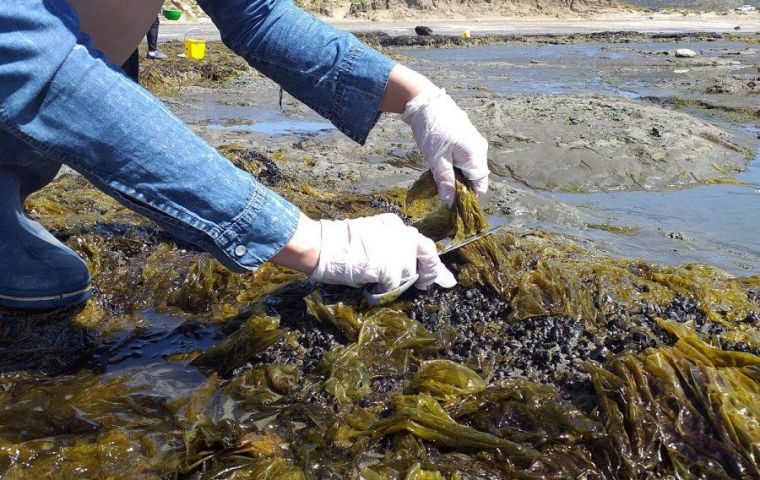MercoPress. South Atlantic News Agency
Patagonia university to develop noodles made of algae which shall taste like squid
 The University has been allocated funds for the purchase of machinery to launch large-scale production of healthy pasta
The University has been allocated funds for the purchase of machinery to launch large-scale production of healthy pasta Argentina's National University of Patagonia San Juan Bosco from Comodoro Rivadavia, in the province of Chubut, is undertaking the development of noodles with a 30% substitution of wheat flour for algae which shall taste like squid, it was announced.
The nutritional change means a reduction in calories, lipids and carbohydrates.
Some noodles with seaweed “with squid flavor” created by researchers from the National University of Patagonia San Juan Bosco, based in Comodoro Rivadavia, will go into production stage after obtaining a financing of AR $ 7.4 million (some US $ 740,000 at the official exchange rate) from the Ministry of Science, Technology and Innovation, with which to purchase machinery for their production on a scale for public consumption.
These are noodles with a 30% substitution of wheat flour for algae, which achieves the manufacture of “pasta” with 14% less calories, 16% less lipids, 23% less carbohydrates, 65% more minerals, 12% more protein and 158% more fiber than traditional ones.
“In addition, all minerals increase because calcium, iron, and potassium increase in seawater and it would become a dietary supplement with more vitamins,” explained María Angélica Fajardo, director of the project for dry noodles with Patagonian seaweed.
Fajardo pointed out that “classic noodles provide many carbohydrates and, by incorporating the presence of algae, the biological value is increased from 60 to 90%, so we are facing a pasta with a higher percentage of fibers, vitamins, antioxidants and with a very good biological value.”
The initiative was financed with $ 7,429,692.60 that will be allocated to the purchase of equipment after participating in the call “Science and Technology against hunger” launched by the Ministry of Science, Technology and Innovation of the Nation.
“The noodle will be called Don Bosco, after the name of our university, which will be the beneficiary institution of the contribution because we love the public university,” said Fajardo.
The project to incorporate 30% of ”Pyropia columbina“ seaweed into traditional wheat noodles takes more than 20 years of collective development.
“It was a participatory project in which specialists from the university, students, interns, scholarship holders and even high school teenagers who collaborated with the extraction of the resource on nearby beaches were involved,” explained Fajardo.
The 30% percentage of algae in the dough also has to do with consistency. “We tested with 10%, 20% and more until a suitable point was found to give consistency to the dough and the chefs who participated in the project let us know,” she explained.
Flavor specialists defined the taste as “medium sweet with an Umami tendency” although the promoter described it in a more popular way: “They taste like noodles with squid.”
The initiative came from the Chair of Bromatology and Nutrition of the Department of Biochemistry of the Faculty of Natural Sciences and Health Sciences of the National University of Patagonia San Juan Bosco.
The researcher recalled that “after having studied the nutritional value of the algae, its percentages of vitamins, minerals, carbohydrates, fibers, fatty acids and essential amino acids” she went on to the stage of “knowing the hygienic, sanitary and psychosensory aspects.”
The project had the support of the Comodoro Knowledge agency, which depends on the Comodoro Rivadavia City Council.
Agency spokeswoman Maite Luque, told Télam that they collaborated in the assembly of the project to obtain financing based on an idea that they considered “very opportune, which was to substitute common noodles for a food that is hyperprotein and in communities specific with specific food needs”.
Luque stressed that “the consumer needs to know what this food is about and why it is important, even as an auxiliary to public health, since it provides value and food quality.”
The intention is that the population knows how the noodles are made, what the algae is and how many properties it has, with the hope that, in the not too distant future, they can also participate in the collection of the species that is common on the Patagonian coast.
Chubut has a long tradition in the use of algae for the food industry since for decades it was a leader in the export of ”agar-agar”, an element from marine vegetation that is used as a stabilizer and preservative for puddings and desserts.
(Source: Telam)




Top Comments
Disclaimer & comment rulesCommenting for this story is now closed.
If you have a Facebook account, become a fan and comment on our Facebook Page!